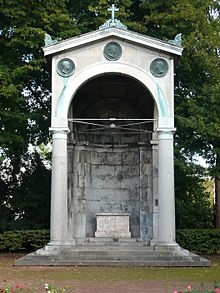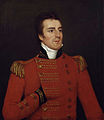- Congress of Aix-la-Chapelle (1818)
-
The Congress or Conference of Aix-la-Chapelle (Aachen), held in the autumn of 1818, was primarily a meeting of the four allied powers Britain, Austria, Prussia and Russia to decide the question of the withdrawal of the army of occupation from France and the nature of the modifications to be introduced in consequence into the relations of the four powers towards each other, and collectively towards France. This was the third conference to bear that name; the first took place in 1668, the second in 1748.
Contents
Delegates
The congress convened in Aachen on 1 October 1818. It was attended in person by the emperor Alexander I of Russia, the emperor Francis I of Austria, and Frederick William III of Prussia. Britain was represented by Lord Castlereagh and the duke of Wellington, Austria by Prince Metternich, Russia by Counts Capo d'Istria and Nesselrode, Prussia by Prince Hardenberg and Count Bernstorff. The Duc de Richelieu, by favor of the Allies, was present on behalf of France.
A treaty for withdrawal
The evacuation of France was agreed to in principle at the first session, the consequent treaty being signed on 9 October. The immediate object of the conference being thus readily disposed of, the time of the congress was mainly occupied in discussing the form to be taken by the European alliance, and the "military measures," if any, to be adopted as a precaution against a fresh outburst on the part of France. The proposal of the emperor Alexander I to establish a "universal union of guarantee" on the broad basis of the Holy Alliance, after much debate, broke down on the uncompromising opposition of Britain; and the main outcome of the congress was the signature, on 15 November, of two instruments: a secret protocol confirming and renewing the Quadruple Alliance established by the treaties of Chaumont and Paris (of 20 November 1815) against France, and a public "declaration" of the intention of the powers to maintain their intimate union, "strengthened by the ties of Christian brotherhood," of which the object was the preservation of peace on the basis of respect for treaties. The secret protocol was communicated in confidence to Richelieu; to the declaration France was invited publicly to adhere.
Diverse resolutions
Besides these questions of general policy, the congress concerned itself with a number of subjects left unsettled in the hurried winding up of the Congress of Vienna, or which had arisen since. Of these the most important were the questions as to the methods to be adopted for the suppression of the slave-trade and the Barbary pirates. In neither case was any decision arrived at, owing mainly to the refusal of the other powers to agree with the British proposal for a reciprocal right of search on the high seas and to the objection of Britain to international action which would have involved the presence of a Russian squadron in the Mediterranean. In matters of less importance the congress was more unanimous. Thus, on the urgent appeal of the king of Denmark, Charles XIV of Sweden received a peremptory summons to carry out the terms of the Treaty of Kiel; the petition of the Prince-elector of Hesse to be recognized as king was unanimously rejected; and measures were taken to redress the grievances of the German mediatized princes. The more important outstanding questions in Germany, e.g. the Baden succession, were after consideration reserved for a further conference to be called at Frankfurt/Main.
European governance
In addition to these a great variety of questions were considered, from the treatment of Napoleon at Saint Helena to the grievances of the people of Monaco against their prince and the position of the Jews in Austria and Prussia. An attempt made to introduce the subject of the Spanish colonies was defeated by the opposition of Britain. Lastly, certain vexatious questions of diplomatic etiquette were settled once and for all. The congress, which broke up at the end of November, is of historical importance mainly as marking the highest point reached in the attempt to govern Europe by an international committee of the powers. The detailed study of its proceedings is highly instructive in revealing the almost insurmountable obstacles to any really effective international system.
Gallery of delegates
References
 This article incorporates text from a publication now in the public domain: Chisholm, Hugh, ed (1911). Encyclopædia Britannica (11th ed.). Cambridge University Press. The Britannica, in turn, cites the following sources:
This article incorporates text from a publication now in the public domain: Chisholm, Hugh, ed (1911). Encyclopædia Britannica (11th ed.). Cambridge University Press. The Britannica, in turn, cites the following sources:- Stella Ghervas, Réinventer la tradition. Alexandre Stourdza et l'Europe de la Sainte-Alliance, Paris, Honoré Champion, 2008. (ISBN 978-2-74531-669-1)
- F.O. Records (the volumes marked Continent, Aix-la-Chapelle, To and from Viscount Castlereagh)
- British State Papers Volumes V & VI.
- G. F. de Martens, Nouveau recueil de traites, &c. (Göttingen, 1817–1842); F. de Martens, Recueil des traites conclus par la Russie, &c. (1874 in progr.)
- F. von Gentz, Depeches inedites, &c., ed. Baron Prokesch-Osten, 3 vols. (1876–1877)
- Metternich, Memoirs
- Wellington, Suppl. Despatches
Categories:- Aachen
- Bourbon Restoration
- Post-Napoleonic congresses
- 1818 in France
- Diplomatic conferences in France
- 19th-century diplomatic conferences
- 1818 in international relations
Wikimedia Foundation. 2010.










